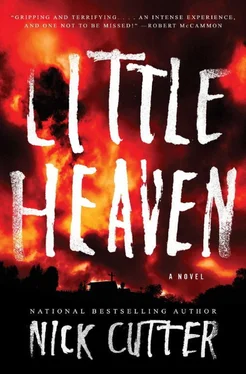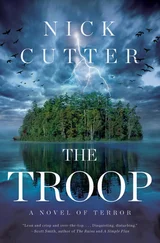But there was another possibility—one that had dawned years ago, when Micah fleetingly touched those glowing ropes that had borne Augustus Preston aloft. He’d felt such warmth and wonderment in that instant. Those ropes felt… heavenly. So perhaps those ropes held both Preston and the thing in thrall…?
Maybe the black rock wasn’t the thing’s home. What if it was its prison?
The trees bled away. They came to a spot where the foliage grew sparsely. A rough circle of blast. The vegetation was thinner, struggling to thrive. The leaves of the shrubs were a sick shade of off-white, eaten through with disease. They checked up, a signal pinging in their primal brains.
“Little Heaven,” said Minerva. “We’re standing on its remains.”
The diameter of the patch mimicked the size of the compound. Although there was no clear sign that Minerva was correct—they did not see the rusted ribs of the main gate poking up from the grayish dirt, or the flame-scoured remains of the massive crucifix that had once topped the chapel roof—they were each certain of it. Something emanated from the ground, seeping up like poisoned oil: the curdled, blighted miasma of Little Heaven. The fire-eaten bodies of its worshippers stirred in with the earth. Their ghostly voices drifting up, lamenting, searching for something—relief, perhaps even revenge. Against whom? Whom could they pin the blame on except themselves? Or had their souls ascended heavenward at the moment of their death, as Amos Flesher must have promised? Had they died in a state of grace?
Micah and Ebenezer followed Minerva across the circle of barren ground. The wind scudded at their heels, raising cones of dust. Quite suddenly, Minerva had to tamp down the powerful urge to cry. She swiped her cheeks, certain her fingers would come away wet with tears. But they were dry as bone, dry as the cracked earth under her boots.
“I’m sorry,” she said, though she could not say for whom this apology was meant.
They entered the thicker tree line at the edge of the perimeter. They felt it sucking at their spines—the grieving, implacable tug of Little Heaven, its grim memories, its souls interred beneath the sunbaked dirt—until that tension released, freeing them with almost an audible sigh.
“How do we know the world isn’t full of such things?” said Ebenezer later.
“What things?” said Minerva.
Ebenezer stared up at the sky, pricked with guttering stars. “A man descends into madness, a family goes missing, a backwoods religious compound burns to ashes—how do we know that the cause is earthly? Known? Often we never find out. But we tell ourselves it must be so because to invite other possibilities is to invite madness into our hearts, isn’t it?”
They walked for quite some time in silence, pondering this. Ebenezer had exhausted his capacity for speech. He dragged his leg behind him like a curse.
“There’s one thing I’ve always wondered, Shug,” Minerva said.
Micah made a questioning grunt.
“When we were all there in the rock, you menacing it with the knife like you were going to hack it to pieces,” Minerva said. “This is weird to say, it being so small and weak-looking and all, but… did you get the impression it was all that scared, really?”
This had occurred to Micah as well. At the time, he had believed it was frightened, the way it flinched and mewled. But over the years, he had come to wonder if it had merely been pretending. How could anything like that have any fear of man? Perhaps it had been an act. One facet of the grand game it had played with them all.
“I cannot say.”
“Because it’s not weak, is it?” said Minerva. “Not at all. Christ, it won’t let me die. I can’t even… It won’t even let God take me. Or the devil.”
“I have a theory about that,” Ebenezer said. “What if its power over you is directly influenced by how close you draw to it? Picture a nuclear reactor with a leak. If you’re ten thousand miles away, you’ll feel nothing. If you’re right next to it—if you stick your hand into it—then you’re dead. The closer you get, the more power it has over you. You carry that sickness the rest of your life, okay. But in order for you to truly be at its mercy, you’d have to enter the black rock.”
Minerva nodded, accepting this. “Why did it grant us those wishes, then—because it knew they would cause us more pain than not granting them?”
Neither Micah nor Ebenezer answered her. The truth seemed all too plain.
They hiked until the trees thinned out. The creatures that had plagued them all those years ago—the ones that had torn off Terry Redhill’s head and Ebenezer’s ear, that had ended Otis Langtree’s and Charlie Fairweather’s lives—were not in evidence. They had no use under present circumstances: Micah and the others were making their way to their master’s lair willingly, if not eagerly.
Dawn began to gloss the horizon. They staggered, their legs failing—and then, quite suddenly, they were there.
The gray sand and paling sky. The black rock.
“Dypaloh,” Micah said. “There was a house made of dawn. It was made of pollen and of rain, and the land was very old and everlasting. There were many colors on the hills, and the plain was bright with different-colored clays and sands.”
Ebenezer and Minerva looked at him, confused.
“Read that somewhere,” he said. “Exact opposite of this.”
They rounded the face of the rock where it sheared on a ninety-degree scaling. It was the same as ever—towering, featureless, obsidian. There were no crags or outcroppings where birds might build nests, but then, it would seem an unwise choice for any living thing to dwell upon it. The rock was cold, though the day itself was heating up; a chill radiated off it, as if the coils of a refrigerator were humming behind a quarter inch of stone. The polished surface reflected their features with a funhouse-mirror warp: they somehow looked younger in that shadowy reflection, as if their old selves were trapped in there, too. In many ways, that was true, as a part of them had never left this place.
They hiked around the sheer obsidian angles, and in time they reached the cleft. Though it was now daytime, the sun was blanketed by thick gray clouds. But even if the sun had been shining at full wattage, its light would not have penetrated far inside the rock.
Micah unpacked the last of his gear. He lit the kerosene lantern and tested his flashlight. He patted his pocket to make sure his Buck knife was still there. He shouldered his backpack again. Minerva noticed him wince under its weight.
“You can stay out here,” he said to them.
“Shut up,” Minerva said. “You know we damn well can’t, so quit saying it.”
“We can’t?” Eb said.
“You can,” said Minerva.
Eb seemed to consider taking her up on the offer, but ultimately he shook his head.
“In for a penny,” he said, squinting up at the sky.
THAT OLD SMELL—the smell of living decay—hit their noses the moment they entered the cavern. Darkness swiftly closed over them. The lantern threw wavering shadows on the smooth, dripping rock walls. Their footsteps made no sound: they could have been stepping across an enormous wet sponge. They were filled with terror—as stark as the silvery flash of minnows in a dark pool—but they had no choice. They had surrendered that choice years ago.
“Olms,” Micah said at one point.
He held the lantern above his head; its light fled up to a domed ceiling bubbled within the rock. “There were olms up there last time.”
“The hell are those?” said Minny.
“Salamanders of a sort,” he said. “Thousands of them. White ones.”
Minny said, “Well, ain’t it a crying shame they’re gone.”
Читать дальше












